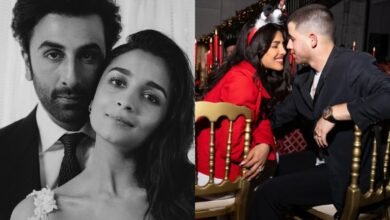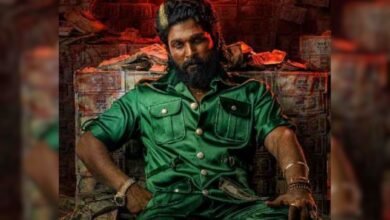A Single-Shot Film Of Phenomenal Power And Ambition 3 and half stars

A still from Iravin Nizhal trailer (courtesy: Radhakrishnan Parthiban)
Cast: Radhakrishnan Parthiban, Varalakshmi Sarathkumar, Robo Shankar, Priyanka Ruth, Brigida Saga, Sneha Kumar, Anand Krishnan and Chandru
Director: Radhakrishnan Parthiban
Rating: 3 and a half stars (out of 5)
Propelled by crackling energy, sustained pace and technical derring-do, veteran actor-writer-director Radhakrishnan Parthiban’s Iravin Nizhal (Shadow of the Night) is a single-shot film of phenomenal power and ambition.
The cinematic bildungsroman spans half a century and pans out across multiple locations to tell a twisted story of a beleaguered man who is left to count his losses in the fiftieth year of a topsy-turvy, tragedy-ridden life that has taken a heavy toll on his mental and emotional health.
Iravin Nizhal, a little over 90 minutes long, is a remarkable synthesis of daring and heart, a dazzling movie experience that skirts around the dangers of a form that might look like a gimmick to some. But such is Parthiban’s creative pluck that he goes out on a limb, unmindful of the risks involved.
With the camera used like a spray-paint gun to fill a massive canvas with pictorial and plot details, Iravin Nizhal is an emotional rollercoaster buoyed by the lead performance and an immersive, riotous colour palette.
Playing in multiplexes in select cities, the Tamil film is preceded by a “making of…” short that reveals the magnitude of the enterprise and the hard days and nights that went into the production of a movie shot in one go with an array of actors, including a horse, a donkey and a mongrel.
By spelling out the sheer enormity of the task that has been accomplished, Parthiban isn’t pleading for lenience from the audience. If anything, the placing of all the ‘secret’ cards on the table demystifies the production process in a manner that could only serve to enhance an attentive viewer’s takeaways from the film.
Iravin Nizhal is an achievement of no mean proportions and, therefore, it does not need wide-eyed surrender from the audience. Look for the delights that it abounds in and you won’t be disappointed.
But delight isn’t probably the right word to use in the context of the film’s dominant tone. Iravin Nizhal is a dark, disquieting story that alternates between the profound and the profane, the playful and the provocative, the pulpy and the poetic.
The film isn’t without its share of blips and somewhat disorienting leaps, but there is beauty even in the film’s stray blemishes because of the unshrinking courage and immense passion that are writ large on the project.
Iravin Nizhal is a giant cinematic mural in motion created with a single stroke of the brush that inevitably took innumerable attempts – the unit got it right after 22 scuttled takes – to execute in its totality. The logistical nightmare that the production was does not reflect in the least bit in the end product.
What is eventually on the screen – the story of a man who is both sinned against and sinning and paying the price for his misfortunes and misadventures – is a vibrant essay rooted in the conventions of commercial Tamil cinema and yet fiercely independent and freewheeling in terms of its directorial vision and technical chutzpah.
The story begins inside a vanity van in which a 50-year-old film financier, Nandu (Radhakrishnan Parthiban), is holed up. Hounded by the media and pursued by the police, he is on the run. Armed with a gun, he leaves the hideout to look for a fake godman (Robo Shankar, who we do not see until much later in the film) he has scores to settle with.
The film moves back and forth between 1971, the year of Nandu’s birth in painful circumstances, and the present, which is no better than any of the other phases that he has encountered and survived in the course of his benighted life.
The man, who has come up the hard way having seen poverty, hunger and brutality up close from infancy to adulthood, is wracked by guilt – his acts of omission and commission are numerous – as much as he seethes with anger at the world that has sold him short. Nandu is desperate to rebuild his ties with his daughter Arputha (Pratiksha Shanker) and her mother (Sai Priyanka Ruth), so he records his story on his mobile phone in the belief that when it reaches his family, they would understand why he deserves compassion and clemency, and not contempt.
The entire narration is delivered in the form of Parthiban’s no-holds-barred confessional although the pivotal character of Nandu is also played at different stages of his life by Chandru (as a boy who is sucked into a world of crime) and Anandha Krishnan (as an adult whose ill-fated relationships with women throw his already turbulent life into further turmoil).
These women – they project different faces of Eve – are played by Sneha Kumar, Brigida Saga, Varalaxmi Sharathkumar and Sai Priyanka Ruth. The women range from the pure to the perfidious and expose him to experiences that determine where he is going to end up.
Iravin Nizhal is embellished with a lively, eclectic A.R. Rahman score made up of a haunting background score and a complement of songs that are both soulful and soaring. The endlessly inventive Iravin Nizhal owes a great deal to the production design – it took two years of planning and execution to set up the 50-odd spaces in which the film was shot – and the cinematography by Arthur A Wilson. One cannot help but wonder, however, whether Iravin Nizhal would have at all been possible without the work of the Gimbal operator on whose shoulders the film literally rested.
Parthiban, whose previous directorial venture was the critically acclaimed solo act Oththa Seruppu Size 7 and who was last seen on screen playing a trade unionist in the web series Suzhal – The Vortex, delivers an emotionally charged performance that balances the internal dynamics of the character with the external manifestations of his anguish and anger.
Being a single-shot film, Iravin Nizhal is bound to invite comparisons with Russian Ark, Victoria and One Cut for the Dead. It is closest in spirit to the last-named film. It also has a bit of Victoria in it. But in the end, in terms of its style and spunk, Iravin Nizhal ploughs its own distinct furrow. It is a movie unlike any other.
Source link





